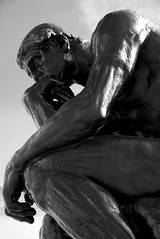
Writing for Inc. Magazines Great Entrepreneur's series, Leigh Buchanan breaks down a fascinating study that pits successful entrepreneurs against career corporate managers in a thought experiment. The study strikes a big chord with me because so many of the things I think are necessary running a small, customer-focused service business are exactly the kinds of things the entrepreneurs describe doing -- but here's the catch, by "successful entrepreneurs", the author means: 15+ years of experience starting successful and unsuccessful ventures and at the time the study was done, the entrepreneurs were running companies with revenue between $200 million and $65 billion a year. That means the customer-focused iterative process mindset is very, very scalable.
While, I definitely think you should go read the full article, here are some of the highlights for me.
On where to Focus Your Energy:
Entrepreneurs fret less about competitors, Sarasvathy [the author of the study] explains, because they see themselves not in the thick of a market but on the fringe of one, or as creating a new market entirely. "They are like farmers, planting a seed and nurturing it," she says. "What they care about is their own little patch of ground."
She contrasts the farming mentality to the corporate market share mentality -- what is the other guy doing and how can I get a piece of his pie? I've often felt that the farming tendency is much more fruitful, because in the end you return to creating a really coherent experience for your clients. You're never actually going to be the other guy, so trying to mimic one or two pieces of what he's doing, you're going to miss something big and fall short. Plus, I really see more and more that it's a myth that the market is a zero sum game. There's lots and lots of room out there, and as Jason Fried once said "there's a new class of freshman every year".
On Testing vs. Guessing:
Ultimately, the best test of any product is to go to your target market and pretend like it's a real business. You'll find out soon enough if it is or not.
I've seen this at every level from "I want to open a new center" down to "I think I'm going to teach this one exercise in class tonight". It's not that you sell people lies and shoddy products, it's that you can't get caught in the mind trap of making it perfect before you get your idea out there. Even if you get really honest feedback from a whole range of people, you've gone from ideas to behavior, which is much more powerful, if you try to sell it.
Check out the contrast:
Corporate executives, by contrast, generally envisioned more traditional vendor-customer interactions, such as focus groups....."I would like to get from them...by meeting with them or getting their input on what they think of the limitation of existing programs....just kind of sit and listen to them telling me...what new features they'd like. And I'd just listen to them talk, talk, talk and then be thinking and develop something between what they want and what's possible technically."
What I really liked about this article, though, was that she made it clear that something like "testing vs. guessing" isn't a tactic that you should copy in your business operations, it's a mindset, or a way of being.
You can't go out and survey customers and say, 'OK, what kinda car do you really want?' I believe very much in living it. If you're gonna write a book about stevedores, go work as a stevedore for a period of time. My company was going to design and sell products for physical therapy, so I worked in rehab medicine for two years.
Overall, I think I found this article so affirming personally because what I hear in these "successful entrepreneurs" is that a process is at the heart of what they do, not something static like an idea or a goal.
Sarasvathy concluded that master entrepreneurs rely on what she calls effectual reasoning. Brilliant improvisers, the entrepreneurs don't start out with concrete goals. Instead, they constantly assess how to use their personal strengths and whatever resources they have at hand to develop goals on the fly, while creatively reacting to contingencies. By contrast, corporate executivesâ€"those in the study group were also enormously successful in their chosen fieldâ€"use causal reasoning. They set a goal and diligently seek the best ways to achieve it.
The contrast between an endless, nourishing, and shifting process and a fixed, rigid, endpoint is a major mental shift that we try to make in energy arts practices, including meditation. It's fascinating to me that it cuts across all disciplines.
image by welshbaloney

Share this post
Twitter
Google+
Facebook
Reddit
LinkedIn
StumbleUpon
Pinterest
Email